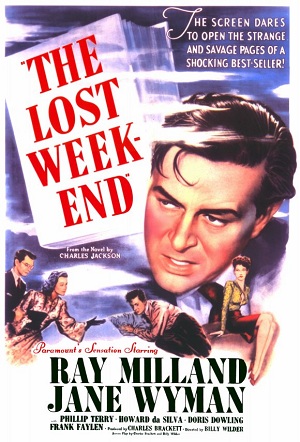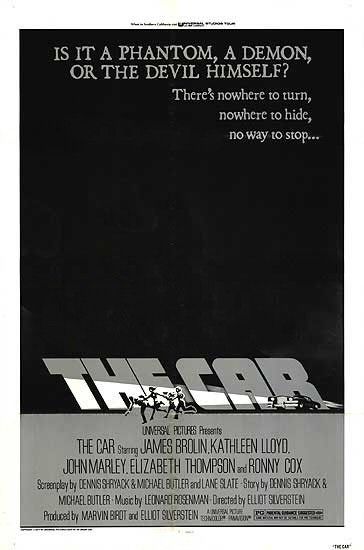I’m currently stuck at home on this beautiful day, dealing with a really bad cold. (Even as I sit here typing this up, I am currently in a feverish haze.) It’s frustrating but, fortunately, I’ve got a lot of movies to watch. After all, TCM is wrapping up their 31 Days of Oscars and my DVR is currently full of nominated films waiting to be reviewed.
For instance, I just watched the 1945 best picture winner, The Lost Weekend. The Lost Weekend was directed by Billy Wilder, a director who is most often associated with sad-eyed comedies like Some Like It Hot, The Apartment, and The Seven Year Itch. However, The Lost Weekend is most definitely not a comedy. Instead, it’s an incredibly harrowing and rather depressing portrait of addiction and lost promise.
Don Birnan (Ray Milland) is a struggling writer. When we first meet him, he’s packing for a weekend trip with his brother, Wick (Philip Terry). The conversation between Don and Wick at first sounds friendly but soon, we start to hear hints of suspicion in Wick’s voice. Wick seems incredibly concerned about what exactly Don is packing and Don starts to get defensive. Don says that it’s been ten days since he had a drink and that there is no more liquor in the apartment. However, whenever Wick turns his back, Don starts to search for the bottles that he’s hidden around his bedroom. (He’s even got a bottle of whiskey hanging on a rope outside the window.) It gets to the point that, whenever Wick isn’t looking, Don is holding a bottle.
And while that may sound potentially humorous, there’s nothing funny about the scene. Don’s desperation is too real. As someone who grew up having to deal with an alcoholic father, I recognized Don and his addiction immediately. Everything about him — from his fast smile to his continual assurances that he’s cleaned himself up — is a facade, designed to help him survive until he can get his next drink.
The main thing about alcoholics is that they’re extremely clever. Don knows that Wick wants to get him away for the weekend so that he can’t drink. When Don’s girlfriend, Helen (Jane Wyman), mentions that she has two tickets for a concert, Don convinces Wick to go to the show with her. Once Wick is out of the apartment, Don can sneak down to the neighborhood bar. When it comes time to leave for that dry weekend vacation, Don manages to accidentally on purpose miss the train.
Left alone for the weekend, Don can now do what he wants. He tries to write about his life as an alcoholic but discovers that his brain is too muddled for him to think straight. So, instead, he drinks. Unfortunately, Wick hasn’t left him any money and has also ordered all the local bars and liquor stores to not allow his brother to run up a tab. As a result, Don finds himself scrounging for money.
In perhaps the film’s most famous scene, Don carries his typewriter down to the local pawnshop so that he can get money to buy a drink. However, the pawnshop is closed for Yom Kippur. The camera follows Don as he staggers around New York City, looking for an open pawnshop. Wilder shot this scene on the streets of New York City, using a hidden camera. The people who we see reacting to Don are not Hollywood extras but instead are actual New Yorkers who had no idea that the pathetic drunk they were gawking at was actually film star Ray Milland.
As the weekend plays out, Don transforms. He goes from being smooth and outwardly confident to being unshaven and desperate. Eventually, Don ends up in a sanitarium, where he’s taunted by a sadistic nurse. (The nurse is played by Frank Faylen, who played Ernie the cab driver in It’s A Wonderful Life.) Even when Don manages to get back to his apartment, he finds himself screaming as he hallucinates a bat eating a mouse. Blood runs down the walls.
Does the film, at least, have a happy ending? It depends. The local bartender, Nat (Howard Da Silva), returns Don’s typewriter to him. Helen convinces Don to write about his lost weekend. Don says that he’s never going to drink again but, at the same time, we can’t help but remember that the movie started with Don saying the same thing…
As directed by Billy Wilder, The Lost Weekend plays out like a noir thriller, full of menacing shadows. The score, composed by Miklos Rozsa, uses a theremin to let us hear the addiction-fueled chaos within Don’s head. Best of all, Ray Milland totally loses himself in the role of Don Birnan, with the vanity of film stardom soon replaced with the pathos of addiction. Even watching the film today, it’s easy to understand how The Lost Weekend won the Oscar for Best Picture of 1945.

